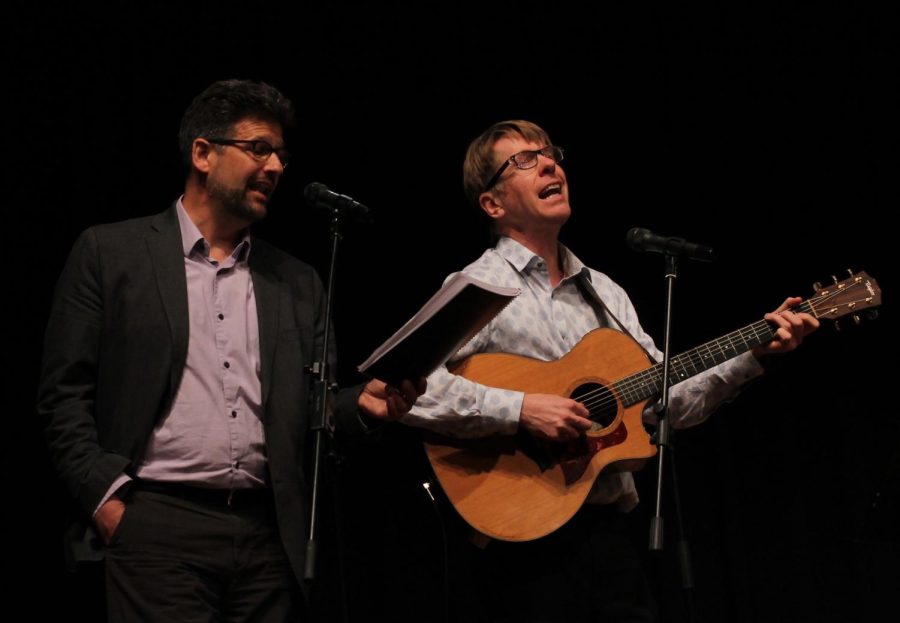Wick Poetry Center encourages young poets at annual Giving Voice event
Hal Walker and David Hassler perform a song at the 16th annual Giving Voice poetry event, hosted by the Wick Poetry Center. Third through 12th-grade students attended the poetry reading, and shared the work they created in collaboration with Kent State students in the Wick Outreach Program.
Kent State’s Wick Poetry Center hosted its 16th annual Giving Voice poetry reading Wednesday, showcasing the talent of young writers after completing a two-month program with Kent State students.
Reeco Hale, a third-grade student at Walls Elementary School, said he feels inspired by his teachers and creativity as a new writer.
“I wanted to write something new,” Hale said. “I thought I should write something that’s very thoughtful. My teachers are creative.”
Hale’s poem, “Banana Tree,” was about the emotions of living creatures and things. Similar to his poem, Hale said he feels deeply intact with his emotions, especially when it comes to poetry.
“It makes your heart feel free,” Hale said. “It makes you feel some type of way. It makes you feel alive.”
Throughout the night, over 100 students from local schools read their poetry in the Student Center Ballroom. All of the material came from the Wick Outreach Program that Kent State students teach through, part of the “Teaching Poetry in the Schools” course.
David Hassler, director of the Wick Poetry Center, said he believes this program is beneficial to both the students and the Kent State undergraduate teachers.
“It often ends up being this big revelatory experience for undergraduate students to engage and go out into the community and share their passion,” Hassler said.
The program requires several components. First, January and February of the semester allow student teachers complete work with their own poetry while slowly being introduced to different teaching concepts.
The students then spend March and April visiting five local schools to teach beginner poetry to children. The goal is for students to embrace writing and use their creative abilities to produce something that gives the students a voice.
“They get to witness the discovery that the students are making at all different age levels through creative writing,” Hassler said.
Avery Linn, a seventh grader, uses poetry to express herself and describe her feelings.
“Poetry allows me to express myself and helps me grow as a writer,” Linn said. “I write about how I feel, how my soul feels, how my soul makes me feel and what my soul itself feels like.”
The program is intended to foster growth not only within the young poets, but the teachers, as well.
“(The teachers) practice their own poetry and find ways to creatively teach that and inspire others,” Hassler said.
Isaiah Hunt, a junior English major and teaching partner for the program, said he believes this experience was worthwhile.
“It’s very wonderful because you get to see the inspiration you give to the kids,” Hunt said. “We get to fuel their passion for poetry and help them expound their imagination.”
Abigail Rambler, a seventh grader, said that the program was beneficial and aided her in the writing process.
“I’m very creative,” Rambler said. “It’s taught me a lot about poetry and how to move your ideas to make them more than what you started with.”
Hunt said he thinks that the students’ creativity reflects their imagination and is thankful he’s able to work with students who have such rich imaginations and passion for words.
“There’s hope in the world that there are these kids who hold onto their imagination and want to their voice to be heard through poetry,” Hunt said.
Lyric Aquino is the humanities reporter, contact her at [email protected].



